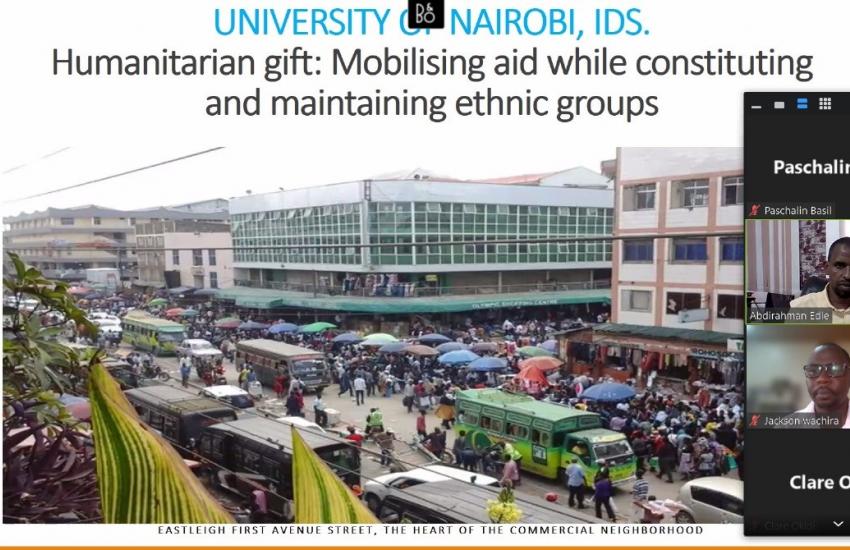IDS holds online seminar on Mobilising Aid While Constituting Ethnic Groups: The Role Of Mosques and Kinship Associations
The Institute for Development Studies on Thursday 15th February 2024 (2pm-3.30pm EAT) held an online seminar themed “Mobilising aid while constituting ethnic groups: the role of mosques and kinship associations”. The presenter was Abdirahman Edle Ali. Edle is a doctoral student at the University of Nairobi and the University of Copenhagen. He has previously worked as practitioner on participatory integrated community development. His research focuses on displacements, refugee education, urbanization, and diaspora engagements in Somalia. He has published in the Journal of Security Dialogue (SD) in 2022, Journal of Refugee Studies (2023). He is also a research consultant and has worked with Durham University, Rift Valley Institute (RVI), Peace Research Institute Oslo (PRIO), Wasafiri Consulting and Clingendael Institute.
The institute was privileged to have Edwige Marty of NMBU - Norwegian University of Life Sciences as the discussant. Her research interest focuses on socio-political dimensions of climate change adaptation. Further, she is working in the drylands, and her work cuts across pastoralism, climate change adaptation as well gender and inclusion. She has written on climate change in the context of changing pastoral livelihoods and worked on a podcast on humanitarianism in the context of climate-resilient development.
The session was moderated by Daniel Wachira.
The abstract of the paper reads as follows:
“This article centers on the neglected role of the near Somali diaspora in mobilizing and delivering humanitarian support to Somalia. We argue that the debate concerning aid in Somalia has concentrated on international organizations and underplays the complexity of humanitarian support. Focusing on mosques and kinship associations in Nairobi, we ask how Somalis in Kenya coordinate and administer humanitarian support for Somalia. To address this question, we analyzed online lectures by Islamic clerics and conducted in-depth interviews, along with three focus group discussions in Eastleigh (Kenya) and Mogadishu (Somalia), encompassing both
donors and recipients of diaspora aid. We found that mosques and clan associations are used in distinct approaches when responding to humanitarian crises in Somalia. They target different social groups. While mosques mobilize aid during spectacular events, usually some form of disaster that affects larger population groups, kinship associations tend to restrict their aid to their own clan group or, at the very least, locations where their clan dominates. Both forms of humanitarian aid constitute mechanisms for preserving and maintaining long-distance relationships within the cultural boundaries of religion and clan.”
During the presentation, Edle focused on the mosques and clan associations, and how these associations mobilize and deliver humanitarian aid on the basis of establishing, expanding and maintaining social relationships within the Somali ethnic community but with different focus: religion and clan. He noted that mosques associations tend to focus on spectacular crises such as droughts, floods, terrorist attacks and public health emergencies that capture widespread attention. On the other hand, different sub clans have their own kinship associations and they help save lives during crises, alleviate poverty, promote economic growth and improve the overall wellbeing of their communities.
The discussant, Edwige, commended Edle for the interesting and relevant paper he is working on. She said it teases out links between the near-diaspora and the classical diaspora humanitarianism.
The discussant noted that Edle could improve the paper through exploring the following issues:
- The sustainability aspects of this kind of aid. Is it one-off or long term? Does it become part of family adaptation strategy?
- What are the dimensions of how clan associations have evolved over time and what are the implications of this? This issue was raised because Edle had mentioned that this aid is sometimes politicized.
- Gender dynamics – the paper had highlighted male domination in the contribution of aid especially through the mosque associations.
- Inclusion and exclusion – how are the mosque and clan associations members/contributors chosen? Who may be excluded in giving or receiving aid?
- What are the technology implications?
- What identities are represented or rules of operating these associations?
- Reciprocity – implications of the power relations that emerge from the giving and receiving of aid?
The Moderator also noted some issues that could be addressed to improve the paper:
- Theory – he suggested that Edle could integrate the three theories (Gift, community and structural, feminism theories)
- He noted that Edle had not showed how the analysis was done.
- The paper highly highlighted the exclusivity between the mosque and clan associations, are there then, any points of convergence?
Some other questions that featured in the plenary were:
- Adan – my question is regarding intergeneration transfer of this values as a safety shock. Why low uptake in later generations when it is actually promoting the sense of unity?
- Prof. P. Kamau – what is the gender composition of these associations and does it have any impacts in resource mobilization and distribution?
- Kabugi – with the increase of digital money transfer, does the gifting/humanitarian intervention during the spectacular crises involve cash transfer through mobile money?
- Indimuli – how do these associations relate or perceive other associations and formal humanitarian model?
Edle responded to some of the raised points by stating that:
A lot has been written about the sustainability of clan associations humanitarianism and there is an evolution from local, in-kind giving to monetary. Those in diaspora who once lived in Somalia keep in touch and contribute in aid. Their children, however, who have never been to Somalia may or may not give aid in monetary form, but there is an opportunity for them to give in other ways such as skills transfer, job creation, etc.
He also committed to explore the suggested points to improve his work.


